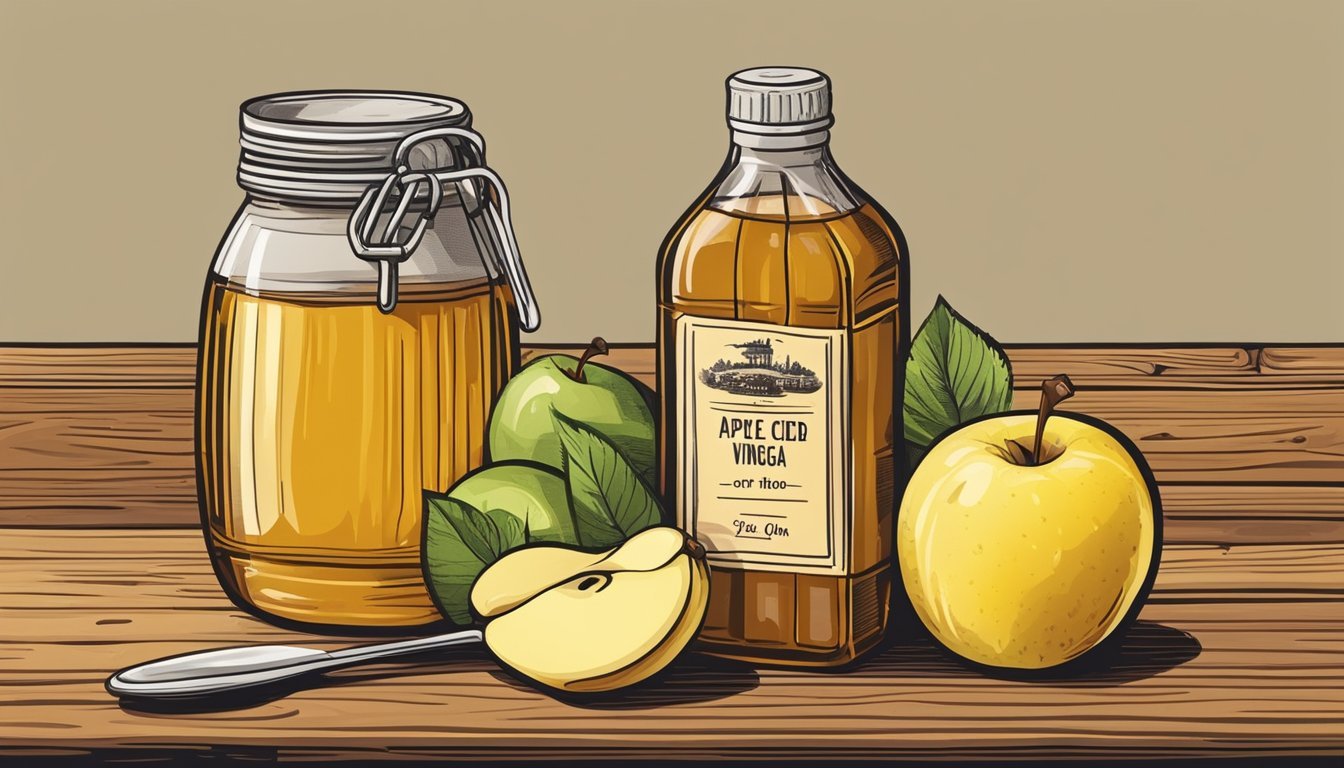Apple Cider Vinegar Substitutes
Top Alternatives for Your Recipes
Apple cider vinegar is a staple in many kitchens and a popular ingredient used in salad dressings, marinades, and many other recipes. Its distinct tangy flavor can enhance the taste of various dishes, while its purported health benefits add to its appeal. However, sometimes this ingredient may be unavailable or unsuitable for certain dietary preferences, making it necessary to find an appropriate substitute.
A suitable apple cider vinegar substitute should offer a similar acidic profile to balance flavors in a dish. Balsamic vinegar, with its fruity undertones and wine-like sweetness, can be a close match especially in dressings and cooked dishes. Lemon juice and lime juice provide a citric acid-based alternative that brings a different but comparable zesty flavor. These two are particularly effective substitutes in recipes requiring raw apple cider vinegar, such as in fresh marinades or as a flavor enhancer in beverages.
When an alternative with a more mellow taste is needed, rice vinegar can serve as a substitute due to its subtle sweetness, which compensates for the lack of apple flavor. Each substitute may not perfectly mimic the unique taste of apple cider vinegar but can provide an adequate replacement that complements the flavors of most recipes where apple cider vinegar is called for.
Understanding Apple Cider Vinegar
Apple cider vinegar is a multifaceted ingredient renowned for its unique properties, which range from culinary applications to potential health benefits.
Composition and Health Benefits
Apple cider vinegar is produced through the fermentation of apple juice, which transforms sugars into acetic acid, giving it its distinctive tart flavor and pungent smell. Compositionally, it contains trace amounts of vitamins, minerals, amino acids, and antioxidants. While it is low in vitamins and minerals, it does contain a small amount of vitamin C and B vitamins. It has a negligible amount of fiber and protein but is also low in calories.
Regarding health benefits, proponents suggest that apple cider vinegar can aid in several health aspects, such as supporting weight loss, balancing blood sugar levels, and improving digestion. However, these claims should be approached cautiously as scientific evidence varies, and it should not replace conventional medicine.
Common Uses in Cooking
In cooking, apple cider vinegar is highly versatile. It can be used in marinades, to add acidity to sauces, or as a salad dressing base. It is also commonly used in pickling to preserve vegetables, due to its acidic nature. The characteristic flavor of apple cider vinegar—sharp with a hint of fruity sweetness—makes it a popular choice in recipes that require a balanced, tangy flavor profile.
Culinary Substitutes for Apple Cider Vinegar
When apple cider vinegar is unavailable or a different flavor profile is desired, various alternatives can be employed in culinary applications. These substitutes offer versatility and can complement different ingredients effectively.
White Vinegar and Its Uses
White vinegar, with its clean and sharp taste, is a staple in many kitchens and can replace apple cider vinegar in a 1:1 ratio. It's particularly suited for pickling, marinades, and baking, where its higher acidity and less complex flavor profile provide the necessary tang without overpowering other tastes.
Uses: Pickling, marinades, baking
Replacement Ratio: 1:1
Citrus Juices as Alternatives
Citrus juices, like lemon and lime, offer a zesty, fresh flavor that can mimic the acidity of apple cider vinegar. They work splendidly in dressings or when a brighter note is needed in a dish.
Lemon Juice: Ideal for salad dressings and marinades; use equal parts in substitution.
Lime Juice: Stronger taste, suitable for dishes that can handle a vibrant, tart punch.
Wine Vinegars in Cooking
Red and white wine vinegars are excellent for numerous recipes, imparting a depth of flavor commonly associated with wine. Balsamic vinegar, sweeter and with lower acidity, can add a nuanced taste to dressings and glazes.
Red Wine Vinegar: Suitable for robust dishes and sauces; a bit tangier than apple cider vinegar.
White Wine Vinegar: A lighter option, good for seafood or chicken, with a subtlety that complements delicate flavors.
Champagne Vinegar: Less acidic but full-flavored; a two-to-one ratio with apple cider vinegar is recommended.
Fruit Juices for Sweetness
Apple juice and other fruit juices provide the sweetness and subtle fruitiness of apple cider vinegar and can be diluted with a bit of vinegar or lemon juice for added tang. They perform well in recipes that benefit from a touch of sweetness.
Substitute: Use equal parts of fruit juice in place of apple cider vinegar, or dilute as needed.
Other Vinegar Varieties
Additional kinds of vinegar like sherry and malt vinegar offer distinct flavors suitable for specific uses. Sherry vinegar adds a rich, nutty flavor, while malt vinegar, with its yeasted note, is great for fried foods.
Sherry Vinegar: Use in Spanish-inspired dishes or where a warm, complex flavor is beneficial.
Malt Vinegar: Best paired with fried foods, particularly for a British flair.
Substitutes in Recipes
When cooking, the right substitute can maintain the flavor, texture, and aroma of the dish. This section provides specific alternatives for apple cider vinegar in various types of recipes, ensuring that dietary preferences and ingredient availability are taken into account.
Substitutes in Marinades and Dressings
In marinades and dressings, a suitable substitute should complement the other ingredients while maintaining a balance of acidity and sweetness. Balsamic vinegar can be an excellent replacement, especially in vinaigrettes, imparting a similar fruity undertone with a sweeter, more pronounced flavor. For a more savory recipe with a tart component, red wine vinegar is recommended, albeit starting with a small amount and adjusting to taste due to its stronger profile.
Baking with Vinegar Substitutes
Baking requires precise acidity for leavening and flavor. When substituting for apple cider vinegar, lemon juice offers the necessary acidity and adds a small amount of micronutrients. Replace apple cider vinegar with lemon juice using a 1:1 ratio. For those desiring a subtle champagne flavor, champagne vinegar can be an alternative, utilized at a 2:1 ratio as a lighter substitute.
Substitutes for Vegan and Gluten-Free Diets
Vinegar substitutions in vegan cakes or gluten-free recipes can be pivotal for those with specific dietary needs. Lime juice can stand in for apple cider vinegar to preserve the fruity tasting acidity essential for certain dishes. When adjusting for gluten-free requirements, ensure that malt vinegar is avoided as it contains gluten, and opt for a naturally gluten-free substitute like rice vinegar.
Adjusting Flavor Profiles
Every substitute has a unique flavor profile that can affect the outcome of a dish. Malt vinegar, with its yeasted note, pairs well with fried and crispy foods. However, for those averse to altering the taste significantly, a more neutral vinegar like white wine vinegar might be recommended, allowing the other flavors of the dish to stand out without the vinegar dominating the palate.
Nutritional Considerations for Substitutes
When replacing apple cider vinegar in a recipe, it is crucial to consider the nutritional impact of the substitutes. Each alternative brings a different profile with respect to calories, sugars, carbohydrates, and minerals.
Caloric Content of Substitutes
Balsamic vinegar, given its sweet complexity, tends to be higher in calories compared to apple cider vinegar. For example, a tablespoon of balsamic vinegar contains approximately 14 calories, whereas an equal amount of apple cider vinegar usually contains about 3 calories. Substitutes like rice vinegar offer a lower caloric alternative, similar to apple cider vinegar, typically containing under 5 calories per tablespoon.
Sugars and Carbohydrates in Substitutes
The sugar content also varies. Balsamic vinegar contains about 2.7 grams of sugars per tablespoon, which could impact blood sugar levels more than apple cider vinegar, which usually has less than 0.1 grams. Rice vinegar, on the other hand, has minimal sugar content and a negligible amount of carbohydrates, making it a suitable option for those monitoring their sugar intake.
Sodium and Other Minerals
Sodium levels in vinegar substitutes can differ significantly. Malt vinegar, for example, has a higher sodium content, which can be around 3 milligrams per tablespoon. Substitutes like lime juice have a negligible sodium content but don’t provide the same vinegar taste if that’s needed in the recipe. It is essential to read the nutritional labels of potential substitutes to ensure they meet one's dietary needs.
DIY and Homemade Substitutes
Home cooks can create effective apple cider vinegar substitutes using commonly available ingredients. These DIY alternatives can replicate the fermented, sour profile that recipes often depend on.
Creating Your Own Fruit Vinegars
To make a fruit vinegar, one needs only fruit juice and time. Fermented apple juice, for instance, can be allowed to ferment and acidify naturally, resulting in a product with a sour flavor profile similar to apple cider vinegar.
Ingredients:
Fruit juice (preferably from apples or grapes)
Sugar (to feed the fermentation, if needed)
Directions:
Combine fruit juice with a teaspoon of sugar in a clean jar.
Cover with a cloth to allow airflow and let it sit in a warm, undisturbed place.
Wait for the natural fermentation to occur, which can take several days to weeks.
Strain the product to remove any solids.
Mixing Sweeteners with Acidic Components
Sweeteners like honey or maple syrup can be mixed with acidic components to create a substitute for apple cider vinegar.
Combination Suggestions:
Acidic Component Sweetener Suggested Uses White wine vinegar Honey Salad dressings, marinades Lemon juice Maple syrup Glazes, beverages Lime juice Honey Salsas, ceviche, tropical-inspired dishes
Directions:
Select your acidic component, such as lemon or lime juice.
Combine it with a small amount of sweetener.
Adjust the ratio to taste, aiming to mimic the complex tartness of apple cider vinegar.
Considerations for Special Diets
When seeking substitutes for apple cider vinegar, it's important for individuals on special diets to consider the sodium and sugar content to ensure that the alternatives align with their dietary requirements.
Substitutes for Low-Sodium Diets
For low-sodium diets, the key is to avoid substitutes that can contribute a significant amount of sodium to the diet. Rice vinegar is a suitable option as it naturally contains less sodium than some other vinegars. When choosing a substitute, one should always read the nutritional labels to check the sodium content. It may also be beneficial to dilute stronger vinegars with water to mitigate any additive sodium.
Choosing Substitutes for Low-Sugar Diets
Individuals managing their sugar intake should choose vinegar substitutes carefully, as some vinegars like balsamic can contain higher levels of sugar. White wine vinegar offers a similar acidity to apple cider vinegar with generally less sugar, making it a preferred option. Furthermore, one can add a hint of fruity flavor without sugar by using a splash of lemon or lime juice instead of fruit juices, which often contain added sugars.
Alternative Commercial Products
When seeking out alternatives to apple cider vinegar, consumers will find a variety of commercial products that cater to both vinegar-based and non-vinegar solutions. These products offer convenience and are crafted to enhance flavors in cooking just as apple cider vinegar would.
Pre-made Non-Vinegar Dressings
For salads, marinades, and more, there are numerous pre-made non-vinegar dressings available on the market. These dressings replace the tang and flavor of vinegar with other acidic components like citrus juices or fermented products, providing a similar zest without the use of traditional vinegars.
Examples:
Citrus-based Dressings: Utilize lemon or lime juice for a refreshing tang.
Fermented Products: Incorporate ingredients like yogurt or soy sauce for their natural acidity.
Commercial Vinegar Blends
In the realm of vinegars, commercial vinegar blends are crafted to mimic the fruity acidity of apple cider vinegar, often using a combination of other vinegars and flavor-enhancers.
Examples:
Balsamic Vinegar Mixtures: Often sweeter, with a complex flavor profile.
Fruit-infused Vinegars: Vinegars that have been infused with fruit essences to achieve a taste similar to apple cider vinegar.
These products are tailored for those who desire the convenience of a ready-made solution while cooking or dressing salads, and they can be found in most grocery stores.
Conclusion
When a recipe calls for apple cider vinegar and it's unavailable, culinary enthusiasts can find solace in several effective substitutes.
Lemon juice stands out for its accessibility and close flavor profile, offering a similar acidity with the addition of vitamin C. The replacement ratio is 1:1, allowing for a seamless exchange in both baking and cooking applications.
Balsamic vinegar, with its fruity undertone and wine-like depth, offers a sweeter and more robust alternative. Its best use is in making salad dressings or marinades, adding a distinct richness to dishes.
For fried foods, malt vinegar brings a comparable zesty flavor with a unique yeasted twist, complementing the dish's texture and taste profile.
Similarly, apple juice can mimic the fruitiness of apple cider vinegar while adding nutritional benefits such as vitamins C and A. However, its lower acetic acid content may require adjustment in some recipes.
Lastly, lime juice provides a zesty, tart element with a bold taste. Like lemon juice, it can substitute apple cider vinegar in a straight 1:1 ratio, imparting a fresh and zesty character to dishes.
In summary, these substitutes can confidently replace apple cider vinegar in various culinary contexts. Each alternative brings its own distinct flavor and nutritional profile, empowering cooks to adapt recipes to their tastes and ingredient availability.





